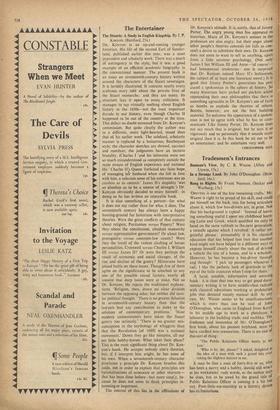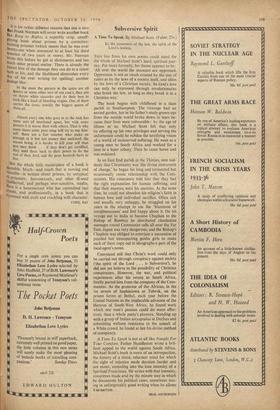Tradesmen's Entrances
'DRIVING is one of the few remaining crafts.' Mr. Wason is right to be proud of his skill, and could pat himself on the back, too, for being articulate about it, which few bus-drivers are, in print. Not that his background is typical : 'Instead of learn- ing something useful I spent my childhood learn- ing Latin and Greek, which qualified me only to hand on the same rubbish to theoext generation, a swindle against which I revolted.' A rather un- grateful phrase: presumably it is his classical education that has helped him (not that another kind might not have helped in a different way) to express himself clearly about the task of driving a vehicle the size of a house, and to a schedule. However, he has become a bus-driver through and through : pick up passengers whenever can; I like the pathetic look of gratitude in the eye of the little creatures when I stop for them.'
A lucid, sensible, informative and amusing book : it is clear that one way to get good docu- mentary writing is to have middle-class radicals with classical educations working at proletarian jobs that demand mainly manual skill. At anY rate, Mr. Wason seems to be unselfconscious, which is more than can be said of John O'Donoghue, who came to England from KerrY in his middle age to work as a platelayer, a labourer in the building trade, and suchlike. The freshness and innocence of Mr. O'Donoghue's first book, about his peasant boyhood, seem to have curdled into mannerism. There is no end of this sort of thing : 'The Public Relations Officer wants to SO you.' 'Who is he, Sir, please?' I asked, delighted at the idea of a man with such a grand title even taking the slightest interest in me.
It may be that a man of forty-five or so, who has been a navvy and a bobby, should still wince at his workmates' rude words, as the author saYs he does, but to be awed by the grand title a Public Relations Officer is coming it a bit to° coy. Poor-little-me-manship as a literary device has its limitations.
Or
It is for rather different reasons that one is sure that Frank Norman will never write another book like Bang to Rights, a superbly crisp, unself- pitying book about prisons by a corrective- training prisoner (which means that he was over twenty-one when sentenced to at least his third sentence of two years or more). Mr. Norman Wrote this before he got at dictionaries and too much other printed matter. There is already the merest hint of the damage they can do to a talent such as his, and the likelihood diminishes every (lay of his ever writing (or spelling) another Passage like: In the main the geezers in the quire are all queers or some other sort of sex case's, they put on theyre white cassocks and do their best to look like a load of bleeding virgins. One of them carries the cross, usually the biggest queen of them all.
Almost every one who goes in to the nick has some sort of imotional upset, 'but with some geezers it is worse than with others. That is why some times some poor mug will try to top him- self, there are a fair number who make an attempt at it but not maney that suckseed, the reason being, it is harder to kill your self than You may think . . . if they don't get certified, they send them back to their peters to do the rest of their bird, and the poor bastards have to live.
But the whole little masterpiece of a book is qt"able. Much—and much that is moving and valuable—is written about prisons, by untypical -prisoners: homosexuals, and other ill-used intellectual, and perhaps over-sensitive, misfits. l'ere is a heterosexual who has committed real crilnes, and professionally, in a book that is crammed with truth and crackling with character.
CYRIL RAY



































 Previous page
Previous page